Dentures – Carmel, IN
Smile Even After Severe Tooth Loss

A full set of teeth makes it possible to comfortably chew many different foods, pronounce your words clearly, and smile without embarrassment. Even one missing tooth can disrupt the harmony of your grin; losing multiple teeth or an entire row of teeth can have an even worse effect on your oral health and wellbeing. Before tooth loss starts to seriously disrupt your quality of life, we encourage you to contact our office and set up an appointment with Dr. Springhetti to ask about the process of getting dentures.
Why Choose Springhetti Dentistry for Dentures?
- Implant Procedure Completed Under One Roof
- Carefully Personalized Full and Partial Dentures
- A Dentist That Cares About Strong Relationships
Types of Dentures
You may immediately think of one kind of denture when you hear the word, but there are actually three different kinds to choose from based on your situation: partial dentures, full dentures, and implant dentures.
- Partial dentures are used when you’ve only lost a few teeth and still want to save the rest. The false teeth will be attached to a metal frame that is attached to your natural teeth with metal clasps. Unlike bridges, partial dentures allow you to replace teeth in multiple areas.
- Full dentures are needed when most of the teeth in the upper or lower jaw are gone. Any remaining teeth will have to be extracted to make room. Thanks to the design of the denture, your new teeth will stay comfortably in place with natural suction; you can also apply a denture adhesive if you need to.
- Implant dentures can be partial or full dentures anchored in place by implant posts. When your dentures are permanently attached to the mouth this way, they can be used to chew even tough foods like steak, and they can be brushed and flossed normally.
How Dentures Are Made
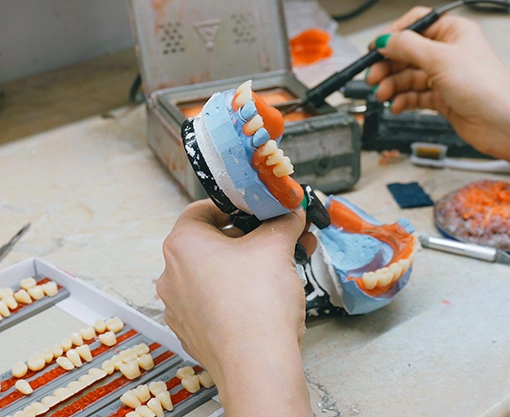
Now that you’ve made the life-changing decision to get dentures, you may be curious what the process will look like. Understanding how your new prosthetics are made and what materials are used will help you appreciate your new smile that much more. Whether you need partial or full dentures, here’s how the magic happens!
What Are Dentures Made Of?

Your new dentures are comprised of two main parts: the base of the denture and the teeth. Here’s a closer look at each component:
- Denture Base: The base is the foundational structure that gives your artificial teeth support. It can be made of a variety of materials such as acrylic, nylon, porcelain, resin, or metal. Full dentures are most frequently made with acrylic because it can be tailored to match your natural gum tissue. Partial dentures may use metal clips with an acrylic base, or in some cases nylon may be used instead of acrylic.
- Artificial Teeth: These are often made from porcelain or resin because both have a natural appearance. However, porcelain is generally a more popular option because it both looks and feels like real teeth. It’s also a very durable material. Unfortunately, however, since it can be abrasive to adjacent teeth, it is typically only recommended for full dentures.
The Denture Creation Process

Because each denture is custom made for the patient’s individual mouth, making them requires a multi-step process. Here’s a step by step look at what this typically looks like.
- Step 1: The first step on your denture journey begins at your dentist’s office, where your dentist will take impressions of your upper and lower gums using a thick paste. This is used to create a plaster model that’s essentially a replica of your mouth. The model will also be used to ensure that your final denture is the correct shape and size. Your dentist may also take some measurements of your jaw at this appointment.
- Step 2: Now the cast can be sent to the dental laboratory where your dentures will be made. There, they will create a wax version of your gum line.
- Step 3: Next, the artificial teeth are set in place. A mechanical device called an articulator is used to attach them with wax. The laboratory technician will make minor adjustments by shaping and carving the wax to ensure it looks just like your real gums. This wax base will then be used for your finished dentures.
- Step 4: Now your wax dentures can be sent back to your dentist for a fitting. If they’re approved by you and your dentist, they will be sent back to the dental lab to advance to the next step in their creation.
- Step 5: Once they have returned to the lab, a dental technician will boil your dentures and get rid of any remaining wax portions. They will then be placed in a flask which is a holding device for plaster to be poured to maintain their shape. The entire flask is then placed in hot water to melt the dentures.
- Step 6: Next, holes will be made in the teeth so the material can attach to it. A liquid separator is added to the plaster to stop the acrylic from sticking to it. Then, the lab technician will inject acrylic into the flask to replace the wax.
- Step 7: The plaster is then carefully removed using special lab tools, revealing your new denture. Your acrylic dentures are placed in an ultrasonic bath to remove any remaining plaster.
- Step 8: Any excess acrylic will be cut from the denture at this stage. After trimming it, your denture will be polished to perfection and sent back to your dentist’s office.
- Step 9: Now that your new denture is ready, you can return to the dental office for a fitting. Here, we will make any adjustments necessary to ensure they fit and work properly.
Adjusting to Your New Dentures

Though they are custom fit to your individual mouth, it is completely normal for patients to experience some discomfort when they first get dentures. Initially, you may notice some mild soreness or have difficulty speaking and eating. However, with time, your mouth will adjust to your dentures, and they’ll eventually feel very similar to your natural teeth. You can speed up the adjustment process by eating soft foods at first, exercising your facial muscles, and experimenting with denture adhesive.
If the discomfort persists, please don’t hesitate to reach out to Dr. Springhetti or Dr. Oberley for help, as further adjustments may need to be made.
The Benefits of Dentures

Psychological Benefits

Dentures can have a huge impact on the state of your mental health. Missing teeth can often lead to self-consciousness, anxiety, and depression, creating a hesitance to smile or socialize. By restoring your smile, dentures help to rebuild your confidence and improve your self-esteem. This renewed sense of self can positively affect your life in many ways, from personal relationships to professional interactions, making you feel more comfortable overall. The psychological boost provided by dentures is one of the most exciting benefits, helping you lead a more fulfilled life full of happiness.
Clearer Enunciation

Dentures can also greatly improve your ability to speak clearly. Missing teeth can often interfere with your tongue placement and breath control leading to slurred or unclear speech, which can be frustrating and embarrassing. Dentures fill the gaps in your teeth, allowing you to articulate words more precisely and confidently. With these prosthetics, you’ll find it easier to pronounce words correctly and communicate effectively, enhancing your overall ability to engage in conversations and express yourself.
Improves Nutrition

Dentures restore your ability to chew a wide variety of foods, which is important for supporting a healthy body and a strong smile. When teeth are missing, it can be challenging to eat the foods you love, often limiting your choices when it comes to your diet. With dentures, you can enjoy a more diverse and healthier menu, ensuring you get the essential nutrients your body needs. This improvement in nutrition can lead to better overall health.
Preserves Oral Health

If you have some natural teeth remaining, dentures help preserve your oral health by preventing them from shifting out of place. Over time, this can lead to bite problems and even additional tooth loss! Denture prosthetics also provide support for your facial muscles, preventing the sunken appearance that often goes with tooth loss. Additionally, wearing dentures can help distribute the forces of chewing more evenly across your teeth and gums, reducing the risk of damage and wear.
Expands Opportunity

A great smile can significantly enhance your career opportunities! It may sound far-fetched, but research shows that dentures can make a positive difference in job interviews, networking events, and professional settings in multiple ways. A complete set of teeth can improve your overall appearance, making you seem more approachable and confident. This can be particularly beneficial in fields that require frequent interaction with clients, colleagues, and customers, ultimately helping you advance in your career and achieve your professional goals.
Understanding the Cost of Dentures
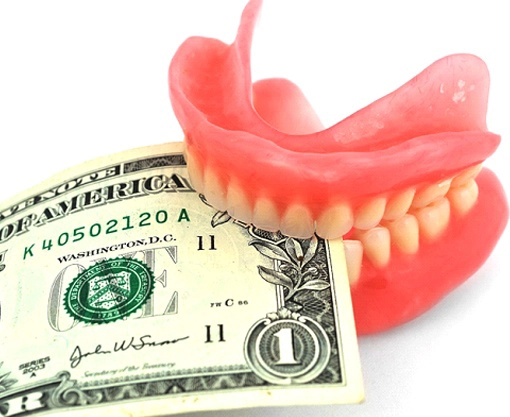
Will you be getting partial dentures or full dentures? Are you planning on getting dental implants? Will you need to have teeth extracted first? Getting dentures means something different for everyone, and we need to take the unique aspects of your situation into consideration before we can estimate the final price of the treatment. Do keep in mind that whatever costs are associated with dentures, it’s generally well worth the price to maintain a healthier mouth and avoid even more serious oral health problems later down the line.
Dentures Aftercare
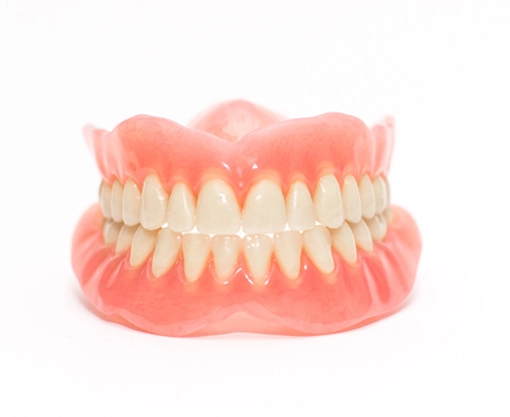
Dentures can simultaneously restore your smile’s appearance and functionality, whether you’ve lost some or all of your teeth. Plus, they won’t develop cavities like natural enamel, but that doesn’t mean you no longer need to visit the dentist. You should schedule a routine visit every six months to prevent common dental issues, like gum disease, as well as more dangerous conditions, like oral cancer.
You must also care for your new teeth properly to continue enjoying the many benefits they provide. Continue reading to learn about maintaining your new teeth, and feel free to contact us for more information.
Removable Dentures
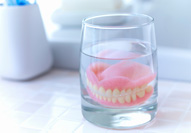
Remove After Eating
With dentures in place, you can enjoy more wholesome foods to support your oral and overall health. However, leftover food in your mouth attracts harmful bacteria that can form plaque on the surfaces of your restoration, contributing to the development of gum disease.
Thankfully, you can avoid this by removing them from your mouth and rinsing them gently with lukewarm water, as overly hot temperatures can warp the base, causing it to no longer fit correctly.
Clean Your Restoration
You should remove your dentures to gently scrub them twice daily with a soft-bristled toothbrush and mild dish soap. Remember, standard toothpaste can abrade the surface and should be avoided. Be sure to rinse them off before reinserting them so you don’t put soap or denture-cleaning solution into your mouth.
Keep Your Dentures Safe
Your prosthetics can become quite slippery during cleanings, and could slip from your fingers and fall to the floor. This can cause chips, cracks, or breaks that make it painful or impossible to wear your dentures. It can help to place a soft towel beneath you when you wash them to cushion them if they fall. You should also store them out of the reach of pets or small children who might not handle them carefully.
Remove Dentures When You Sleep
You might feel tempted to sleep with your new teeth still in your mouth, but they rely on a firm suction against your gums to remain in place all day, which reduces circulation. This can cause sores or blisters to develop, making it uncomfortable to wear them.
Removing them at night gives your connective tissues a much-needed reprieve to rest and recover. Be sure to place your dentures in a glass of water or a soaking solution while you sleep to retain their shape and kill up to 99% of unwanted germs.
Notice Changes
Paying attention to your oral health helps you notice areas of concern early enough to get help before they progress. For example, if your gums feel more tender or appear darker than usual, you may be developing gum disease and should contact our team in Carmel to schedule an appointment.
If you’ve noticed chips and cracks in your dentures, don’t try to fix them yourself. Many patients have inadvertently made matters worse using superglue or other household supplies that aren’t intended for oral use. Call us so we can schedule a time to assess the damage and determine the best course of action for your restoration, whether it involves repair or replacement.
All-on-4 Dentures
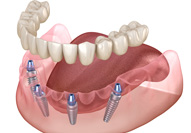
Unlike complete or partial dentures, which form a suction to your gums or clip to healthy teeth in your mouth to remain put, this treatment involves surgically placing four titanium posts into your jawbone to anchor your dentures. They’re not intended to be removed, so care instructions are slightly different.
You should brush twice every day with a soft-bristled toothbrush and non-abrasive toothpaste. It’s best to avoid products containing baking soda and stain-removing agents, which are ineffective on the surface material. You should also floss, and you can purchase special floss threaders to help reach beneath the base of your restoration. Finally, rinsing with antibacterial mouthwash daily reduces bacteria that contribute to the growth of plaque and tartar.
Dentures FAQs
Do Dentures Break Easily?
While dentures are designed to be incredibly durable, they do not last forever and will eventually need replacement. With excellent care, they can last between five and seven years, but accidents can lead to severe damage. For example, dentures are sometimes dropped when they are being cleaned, inserted, or removed, and this can chip artificial teeth or possibly snap a base in half. Dentures can also break due to fitting poorly or having small defects such as notches or scratches in their bases. Even if you take the best possible care of your dentures, they can still become worn down due to the stress of frequent and repeated use.
What Should You Do if Your Dentures Break?
Prosthesis fracture, meaning the denture has snapped in half, is the most serious complication dentures can develop, and it is more likely to happen to top dentures than bottom ones. The nature and severity of your denture’s damage will determine whether the appliance can be fixed, so be sure to give our office in Carmel a call as soon as you notice any issues. In cases of minor damage, we may be able to fix the artificial teeth with composite resin or adjust the base so it fits properly again. However, we will have to recommend replacing a denture that is beyond repair. If this is the case for you, it may be an excellent opportunity to consider upgrading to implant dentures that offer superior chewing power and appliance longevity.
Can Dentures Lose Their Fit Over Time?
Since each denture is carefully customized to fit its patient’s mouth, it should fit incredibly well at first. However, the stress of repeated use and the changing shape of the mouth can make it harder for the denture to fit on the gums over time, so you will probably need to replace your appliance every few years. Continuing to wear poorly fitting dentures can lead to oral health issues such as soreness, swollen gums, bad breath, bleeding soft tissues, and trouble speaking and eating. If your dentures aren’t fitting as well as they used to, call our office in Carmel so we can schedule you for an appointment. Our dentist will be able to adjust your appliance so it fits more comfortably or recommend a replacement if necessary. If you’d like to help your dentures fit better between adjustments, you can experiment with denture adhesives.
Am I Too Young to Get Dentures?
Most adults with missing teeth can safely receive and use dentures. Tooth loss becomes more common with age, so dentures are usually associated with older people. However, about 66% of adults between 40 and 64 and 33% of those between 20 and 39 are missing at least one tooth. Dentures can be an excellent way for adults of any age to address tooth loss, and nearly 57% of those between 65 and 74 wear some type of restorative appliance.

